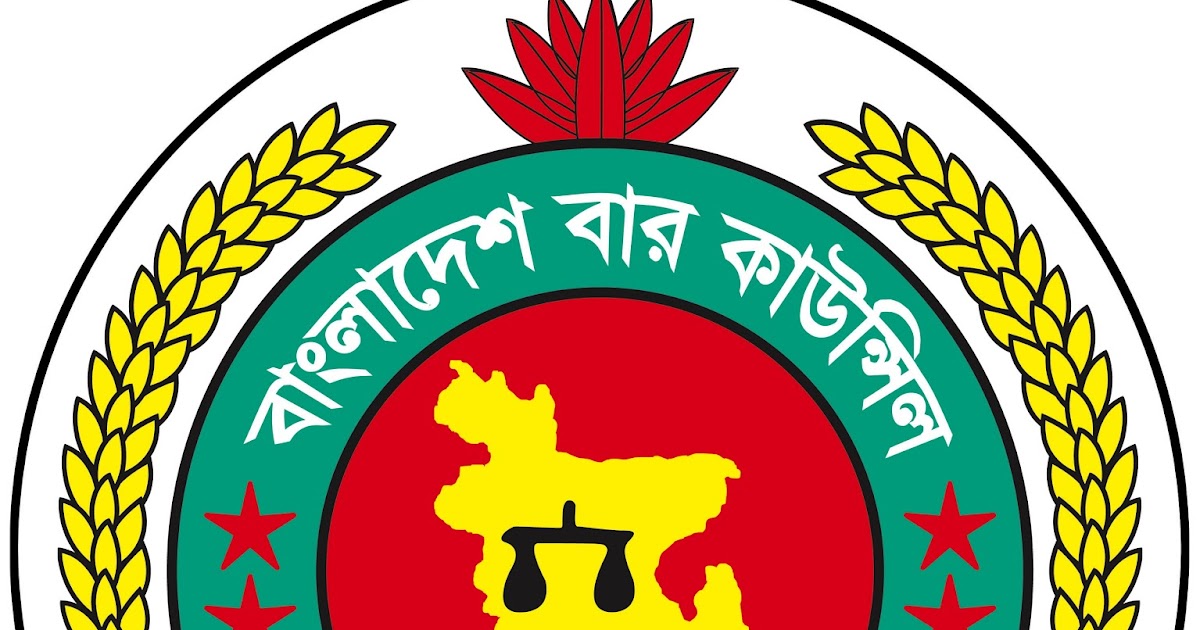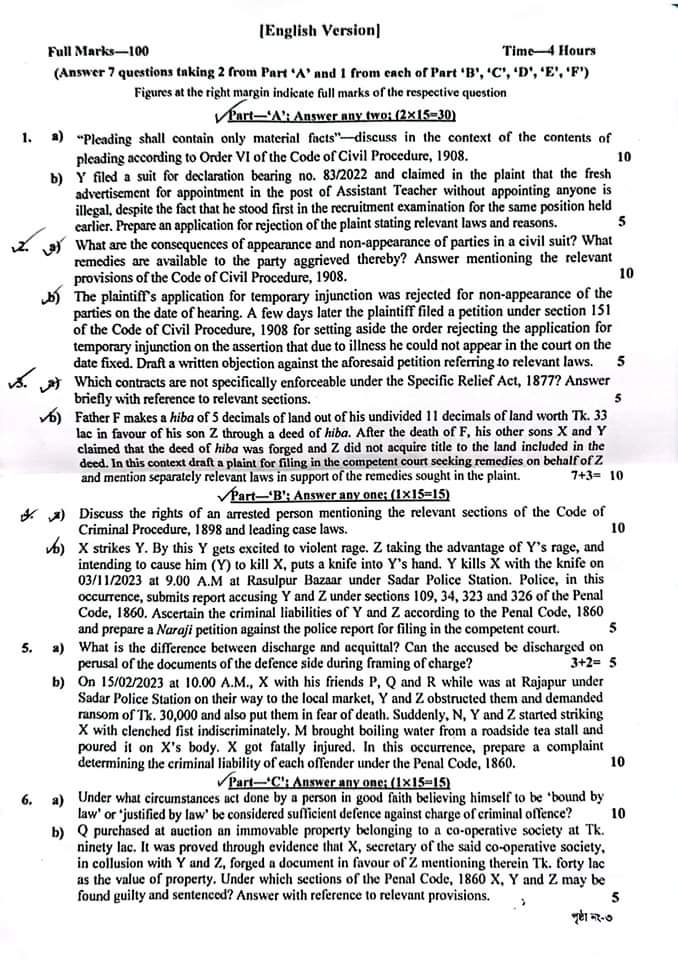Establishment and Jurisdiction of Subordinate Civil Courts in Bangladesh
Introduction: There is a fundamental principle of English law that ‘where there is right there is remedy' (ubi jus ibi remedium). If an individual's right is violated, he can avail remedy from a court competent to try it. However, a litigant having deprived of his right of civil nature can institute a civil suit in a competent civil court. Now, question arises regarding the competency or jurisdiction of civil courts in Bangladesh. This article contains discourse relating to establishment and jurisdiction of the subordinate civil courts in Bangladesh.
Establishment of Subordinate Civil Courts: Subordinate civil courts in Bangladesh were established under the Civil Courts Act, 1887. Section 3 of the Civil Courts Act, 1887 as amended by the Civil Courts (Amendment) Act, 2001 establishes the following five civil courts-
The Court of District Judge
The Court of Additional District Judge
The Court of Joint District Judge
The Court of Senior Assistant Judge
The Court of Assistant Judge
These five courts are regarded as subordinate civil courts in Bangladesh. Section 4 of the Code of Civil Procedure, 1908 provides that the District Court is subordinate to the High Court Division and every court inferior to that and every Courts of Small Cause is subordinate to the High Court Division and District Court.
Meaning of Jurisdiction: The term 'jurisdiction' is not defined in the code. The term 'jurisdiction' is derived from latin term 'juris' and 'dicto' which means 'I speak by the law'.1
Generally, 'jurisdiction' means the power or authority of a court of law to hear and determine a cause or a matter.2 Thus, jurisdiction of a court means the extent of the authority of a court within which it may function. In 'Official Trustee v. Sachindra Nath3 the Supreme Court of India held that
"Courts jurisdiction must include the power to hear and decide the question of issue, the authority to hear and decide the particular controversy that has arisen between the parties."
Jurisdiction of Civil Courts: Jurisdiction of civil courts in Bangladesh is determined by distinct provisions of the Code of Civil Procedure, 1908 and the Civil Courts Act, 1877. Generally, jurisdiction of civil courts may of following kinds:
Subjective Jurisdiction: Subjective jurisdiction specifies a court's power to try suits of a particular subject or nature. Civil courts in Bangladesh have jurisdiction to try all suits of civil nature unless barred by law. Section 9 of the CPC goes with thus:
"The Courts shall (subject to the provisions herein contained) have jurisdiction to try all suits of a civil nature excepting suits of which their cognizance is either expressly or impliedly barred."
However, a civil court has jurisdiction to try a civil suit, if the following two conditions are fulfilled-
the suit must be of civil nature
the cognizance of such suit should not have been expressly or impliedly barred i.e. where a suit is barred by limitation, a civil court cannot try the same.
In the case of Rauf vs. Hamid4 it was held that
“The jurisdiction of the civil courts to try suits of civil nature is all embracing except when it is barred by express provision of law or by clear intendment arising from such law.”
Suits of Civil Nature: Suit of Civil Nature partains to private rights and remedies of a citizen as distinguished from crime and punishment. Thus, a suit of civil nature arises question therein relating to the determination of a civil right and enforcement thereof. For example, Suits relating to right to property, Suits for damages of civil wrong etc.
Territorial or Local Jurisdiction: Section 13 of the Civil Courts Act, 1887 deals with territorial jurisdiction of the civil courts. Every civil court has its own territorial jurisdiction or local limit beyond which it cannot exercise its power. And such local limit is determined by the Government by notification of official gazette.
Again, sections 16 to 21 of the Code of Civil procedure provide general rules regarding exercise of such jurisdiction depending on where the subject matter of the suit is situated. A civil suit is to be instituted in a civil court, if the subject matter of the suit is situated in the local limit or territory of the court.5 If the subject matter is situated in the territory of more than one court, the suit may be instituted in either of the courts.6 If it cannot be determined the territorial jurisdiction regarding the subject matter of the suit, it may be instituted in any of the civil courts in Bangladesh.7 A suit for damage or movable property may be instituted in a court within whose jurisdiction the cause of action arises or where the defendant resides or where the defendant runs his business.8 If any of the above rules does not apply to any suit, the suit shall have to be instituted in a court where the defendant resides or the cause of action arises.9
Objection as to place of institution of a suit must be brought in the court of first instance at the earliest possible opportunity and before settlement of issues where issues are settled. But such objections may be allowed by appellate or revision court to avoid failure of justice.10
Pecuniary Jurisdiction: Section 15 of the Code of Civil Procedure 1908 says "Every suit shall be instituted in the court of the lowest grade competent to try it." Again section 6 of the CPC says "Any civil court shall not exceed its pecuniary limit. "Pecuniary Jurisdiction is of following two kinds:
i. Original Pecuniary Jurisdiction: If a civil suit can be instituted in a court as first instance, it is said to be that the court has original jurisdiction. The following three civil courts have original jurisdiction.
The Court of Joint District Judge
the Court of Senior Assistant Judge
the Court of Assistant Judge
These three courts have the following pecuniary limit to try an original civil suit as specified under sections 18 & 19 of the Civil Courts Act,1887-
Assistant Judges have jurisdiction to try suits valued up to 15 lac taka.11
Senior Assistant Judges can try suits valued from 15 lac 1 taka to 25 lac taka.12
Other suits valued above 25 lac taka are within the jurisdiction of Joint District Judges.13
Suits valued upto 25 thousands taka are instituted in the Small Cause Courts as established under the Small Cause Courts Act, 1887. Assistant Judges are authorized to act as Small cause Courts. A summary procedure is followed in such a suit.
ii. Appellate Pecuniary Jurisdiction: Following courts have appellate jurisdiction in a civil proceeding-
High Court Division of the Supreme Court
the Courts of District Judge
The Court of Additional District Judge
Their pecuniary limits are-
An appeal may be preferred to The High Court Division against decrees and appealable orders passed by the Court of Joint District Judge in cases valued more than 5 Crore taka.14
And the Court of District Judge can entertain an appeal from a decree and appealable orders passed by the Court of Assistant Judge, Senior Assistant Judge and Joint District Judge valued up to 5 Crore taka.15
The Additional District Judge discharges functions assigned to it by the District Judge as per section 8 of the Civil Courts Act, 1887.
4. Jurisdiction as to Transfer or Withdrawal: On the application of any of the parties or by its own motion the HCD or District Court may transfer or withdraw any suit, appeal or other proceeding at any stage of proceeding. Detailed rules regarding transfer and withdrawal of civil suits are laid down throughout sections 22-24 of the Code of Civil procedure.
5. Administrative Jurisdiction: Section 9 of the Civil Courts Act, 1877 provides that "Subject to the superintendence of the High Court Division, the District Judge shall have administrative control over all the Civil Courts under this Act within the local limits of his jurisdiction." However, the High Court Division, the District Judge shall have administrative control over all the Civil Courts subordinate to them.
6. Revisional Jurisdiction: The High Court Division and the Court of District Judge have revisional jurisdiction under the Code of Civil Procedure. Section 115 of the CPC provides that the High Court Division has revisional jurisdiction against a decree or order passed by a Court of District Judge and Addition District Judge or a decree passed by a court of Joint District Judge, Senior Assistant Judge and Assistant Judge. An application for revision may also be preferred in the Court of District Judge against an order passed by a Court of Joint District Judge, Senior Assistant Judge and Assistant Judge.
(As, an application for review a decree or order is to be filed in the same court which gives such decree or order, all the above civil courts have jurisdiction as to review as per section 114 of the Code of Civil Procedure)
Conclusions: Above discussion shows the existing jurisdiction of the civil courts in Bangladesh. The pecuniary limit was below the expected range in the current socio-economic situation before the changes brought by the Civil Courts (Amendment) Act, 2021.
--------------------------------------------------------------------
C.. Takwani, Civil Procedure, Sixth Edition , 2009, Eastern Book Company, at 40
Ibid
AIR (1969)SC
(17 DLR, (SC)515)
Section 16, The Code of Civil Procedure, 1908
Section 17, Ibid
Section 18, Ibid
Section 19, Ibid
Section 20, Ibid
Section 21, Ibid
Section 19, The Civil Courts Act, 1877 as amended by the Civil Courts (Amendment) Act, 2021
Ibid
Section 18, Ibid
Section 21, Ibid






